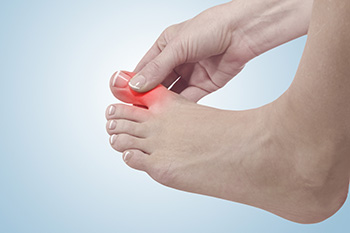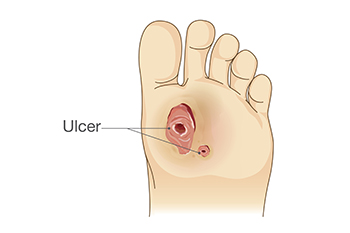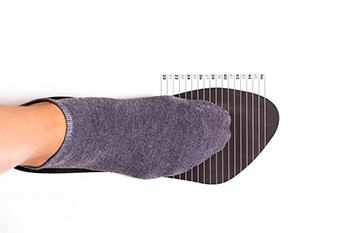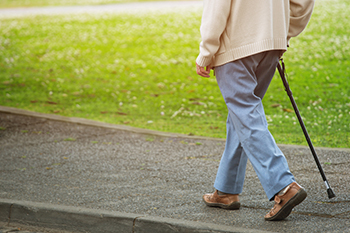Connect With Us
Blog
Items filtered by date: January 2024
Are Bunions Affecting Your Everyday Life?
The Link Between Increased Body Mass and Foot Discomfort

Exploring the correlation between elevated body mass and foot pain unveils a compelling relationship. Excess weight places additional stress on the feet, leading to discomfort and various conditions. The arches, heels, and joints bear the brunt of this burden, potentially resulting in ailments such as plantar fasciitis and osteoarthritis. The arch of the foot may collapse under the strain, causing pain and instability. Additionally, increased body mass may contribute to the degradation of joints, accelerating wear and tear. Overpronation, an inward rolling motion of the foot, becomes more prevalent, exacerbating discomfort. Recognizing this connection is pivotal for those grappling with foot pain, as shedding excess weight through a balanced diet and exercise regimen can significantly alleviate symptoms. If you are overweight and have foot pain, it is suggested that you confer with a podiatrist for treatment..
Obesity has become very problematic at this point in time and can have extremely negative effects on the feet. If you’re an obese individual and are concerned about your feet, contact Dr. John R. Northrup from Superior Foot, Ankle & Wound Care. Our doctors can provide the care you need to keep you pain-free and on your feet.
Obesity and Your Feet
Since your feet are what support your entire weight when standing, any additional weight can result in pain and swelling. Being overweight is one of the main contributors to foot complications.
Problems & Complications
Extra Weight – Even putting on just a few extra pounds could create serious complications for your feet. As your weight increases, your balance and body will shift, creating new stresses on your feet. This uneven weight distribution can cause pain, even while doing the simplest tasks, such as walking.
Diabetes – People who are overweight are at serious risk of developing type-2 diabetes, which has a drastic impact on the health of your feet. As you get older, your diabetes might worsen, which could lead to loss of feeling in your feet, sores, and bruises. You could also become more prone to various infections.
Plantar fasciitis – Pressure and stress that is placed on muscles, joints, and tendons can trigger plantar fasciitis, which is an inflammation of tissue that forms along the bottom of the foot.
If you have any questions please feel free to contact one of our offices located in St. Augustine, and Palm Coast, FL . We offer the newest diagnostic and treatment technologies for all your foot and ankle needs.
Causes and Diagnostic Avenues for Gout

Gout, a form of arthritis, develops when uric acid accumulates in the joints, leading to inflammation and intense pain. The primary cause is an overproduction or underexcretion of uric acid, resulting in crystalline deposits that settle in the joints. Dietary factors, such as excessive consumption of purine-rich foods, can contribute to elevated uric acid levels. Diagnosis involves a comprehensive examination of symptoms that include sudden, severe joint pain, swelling, and redness. Podiatrists may conduct blood tests to measure uric acid levels and analyze joint fluid for crystal presence. Imaging studies, such as X-rays or ultrasounds, aid in assessing joint damage. A meticulous evaluation helps differentiate gout from other forms of arthritis, enabling podiatrists to devise an effective treatment plan. If you have joint pain in your feet and believe it might be caused by gout, it is suggested that you are under the care of a podiatrist who can successfully treat this condition and offer preventive tips.
Gout is a painful condition that can be treated. If you are seeking treatment, contact Dr. John R. Northrup from Superior Foot, Ankle & Wound Care. Our doctors will treat your foot and ankle needs.
What Is Gout?
Gout is a form of arthritis that is characterized by sudden, severe attacks of pain, redness, and tenderness in the joints. The condition usually affects the joint at the base of the big toe. A gout attack can occur at any random time, such as the middle of the night while you are asleep.
Symptoms
- Intense Joint Pain - Usually around the large joint of your big toe, and it most severe within the first four to twelve hours
- Lingering Discomfort - Joint discomfort may last from a few days to a few weeks
- Inflammation and Redness -Affected joints may become swollen, tender, warm and red
- Limited Range of Motion - May experience a decrease in joint mobility
Risk Factors
- Genetics - If family members have gout, you’re more likely to have it
- Medications - Diuretic medications can raise uric acid levels
- Gender/Age - Gout is more common in men until the age of 60. It is believed that estrogen protects women until that point
- Diet - Eating red meat and shellfish increases your risk
- Alcohol - Having more than two alcoholic drinks per day increases your risk
- Obesity - Obese people are at a higher risk for gout
Prior to visiting your podiatrist to receive treatment for gout, there are a few things you should do beforehand. If you have gout you should write down your symptoms--including when they started and how often you experience them, important medical information you may have, and any questions you may have. Writing down these three things will help your podiatrist in assessing your specific situation so that he or she may provide the best route of treatment for you.
If you have any questions, please feel free to contact one of our offices located in St. Augustine, and Palm Coast, FL . We offer the newest diagnostic and treatment technologies for all your foot care needs.
Treatment for Diabetic Foot Ulcers

Diabetic foot ulcers pose a significant risk for individuals with diabetes, due to poor skin circulation and reduced foot sensation. Preventative measures, such as regular foot examinations and maintaining optimal diabetic control, are essential in averting these complications. Once diabetic foot ulcers develop, effective treatment becomes paramount. Typically, a protective dressing is applied, and a podiatrist plays a pivotal role in regular examination, cleaning, and redressing of the ulcer. Podiatrists may also remove hard skin hindering the healing process and prescribe padding or recommend specialized shoes to alleviate pressure. In cases of infection, oral antibiotics can be prescribed, and, if necessary, intravenous antibiotics can be administered. Surgical procedures, such as draining pus or removing dead tissue, may be required in severe infections. While many foot ulcers respond well to treatment, some may lead to severe infections or other complications. Managing diabetic foot ulcers is a long-term problem, emphasizing early intervention and meticulous care for improved outcomes and overall foot health. For help in managing diabetic foot ulcers, it is suggested that you schedule regular appointments with a podiatrist.
Diabetic foot care is important in preventing foot ailments such as ulcers. If you are suffering from diabetes or have any other concerns about your feet, contact Dr. John R. Northrup from Superior Foot, Ankle & Wound Care. Our doctors can provide the care you need to keep you pain-free and on your feet.
Diabetic Foot Care
Diabetes affects millions of people every year. The condition can damage blood vessels in many parts of the body, especially the feet. Because of this, taking care of your feet is essential if you have diabetes, and having a podiatrist help monitor your foot health is highly recommended.
The Importance of Caring for Your Feet
- Routinely inspect your feet for bruises or sores.
- Wear socks that fit your feet comfortably.
- Wear comfortable shoes that provide adequate support.
Patients with diabetes should have their doctor monitor their blood levels, as blood sugar levels play such a huge role in diabetic care. Monitoring these levels on a regular basis is highly advised.
It is always best to inform your healthcare professional of any concerns you may have regarding your feet, especially for diabetic patients. Early treatment and routine foot examinations are keys to maintaining proper health, especially because severe complications can arise if proper treatment is not applied.
If you have any questions please feel free to contact one of our offices located in St. Augustine, and Palm Coast, FL . We offer the newest diagnostic and treatment technologies for all your foot and ankle needs.
How to Select Optimal Running Footwear

Choosing the right size footwear for running is pivotal in ensuring a comfortable and injury-free experience. Begin by measuring your foot length and width, considering variations between brands and models. Prioritize a thumb's width of space between your longest toe and the shoe's end to accommodate natural foot swelling during running. Verify that the shoe snugly holds the heel without excessive tightness or slipping. Additionally, assess the arch support and overall fit to align with your foot's unique structure. It is important to try on both shoes, as foot sizes can differ slightly. As you test the shoes, simulate running motions to gauge comfort and stability. Remember that the right size is not solely determined by numerical measurements; it is about finding a shoe that feels secure, and supportive, and allows for the natural movement of your feet. If you would like additional information on how to choose the right shoe size, it is suggested that you consult a podiatrist.
Finding a properly-fitting shoe is important in reducing injuries and preventing foot problems. For more information about treatment, contact Dr. John R. Northrup from Superior Foot, Ankle & Wound Care. Our doctors will treat your foot and ankle needs.
Proper Shoe Fitting
A common concern when it comes to foot health, having properly fitted shoes can help prevent injuries to the foot. Out feet affect our posture and gait, which in turn affects the biomechanics and overall bodily structure. With 33 joints, 26 bones, and over 100 ligaments, the potential for serious injury is much greater than one realizes. Although the feet cease growth in adulthood, they still change shape as they mature. Here are some factors to consider when it comes to investing in proper fitting shoes:
- Be sure the shoes fit correctly right away
- Ensure the ball of your foot fits comfortably in the widest portion of the shoes
- Even though they may look fashionable, improper fitting shoes can either create adverse conditions or exacerbate existing ones you may already have
- Walk along a carpeted surface to ensure the shoes comfortably fit during normal activity
Keeping in mind how shoes fit the biomechanics of your body, properly-fitting shoes are vitally important. Fortunately, it is not difficult to acquire footwear that fits correctly. Be sure to wear shoes that support the overall structure of your body. Do your feet a favor and invest in several pairs of well-fitted shoes today.
If you have any questions please feel free to contact one of our offices located in St. Augustine, and Palm Coast, FL . We offer the newest diagnostic and treatment technologies for all your foot and ankle needs.
Mobility and Balance Problems in the Elderly

As people age, they often encounter mobility challenges, impacting their ability to move freely. These issues encompass unsteadiness while walking, difficulty in sitting or standing, and the risk of falling. Various factors contribute to these mobility problems in older individuals, including muscle weakness, joint ailments, pain, underlying diseases, and neurological difficulties. Sometimes, multiple mild issues combine, severely affecting mobility. The most common mobility concern among seniors is the risk of falling, which can lead to fractures, injuries, and a persistent fear of falling. Older bones are more fragile and take longer to heal. In cases of minor falls without serious injuries, assisting the person in getting up is vital. If the individual is in pain or injured, it is best to summon help. However, if they can move, they should crawl to a stable chair and use it for support. Falls can result in reduced mobility or bed rest, exacerbating existing medical conditions and leading to new health issues. Encouraging physical activity is essential to combat the fear of falling and its associated inactivity. Even minimal exercise strengthens bones and muscles, enhancing steadiness and preventing fractures. Additionally, conducting a home safety assessment and addressing potential hazards can further prevent falls. If you are a senior or caring for one, it is suggested that you schedule an appointment with a podiatrist for a thorough consultation and communication of any mobility problems and falls.
Proper foot care is something many older adults forget to consider. If you have any concerns about your feet and ankles, contact Dr. John R. Northrup from Superior Foot, Ankle & Wound Care. Our doctors can provide the care you need to keep you pain-free and on your feet.
The Elderly and Their Feet
As we age we start to notice many changes in our body, but the elder population may not notice them right away. Medical conditions may prevent the elderly to take notice of their foot health right away. Poor vision is a lead contributor to not taking action for the elderly.
Common Conditions
- Neuropathy – can reduce feeling in the feet and can hide many life-threatening medical conditions.
- Reduced flexibility – prevents the ability of proper toenail trimming, and foot cleaning. If left untreated, it may lead to further medical issues.
- Foot sores – amongst the older population can be serious before they are discovered. Some of the problematic conditions they may face are:
- Gouging toenails affecting nearby toe
- Shoes that don’t fit properly
- Pressure sores
- Loss of circulation in legs & feet
- Edema & swelling of feet and ankles
Susceptible Infections
Diabetes and poor circulation can cause general loss of sensitivity over the years, turning a simple cut into a serious issue.
If you have any questions please feel free to contact one of our offices located in St. Augustine, and Palm Coast, FL . We offer the newest diagnostic and treatment technologies for all your foot and ankle needs.

